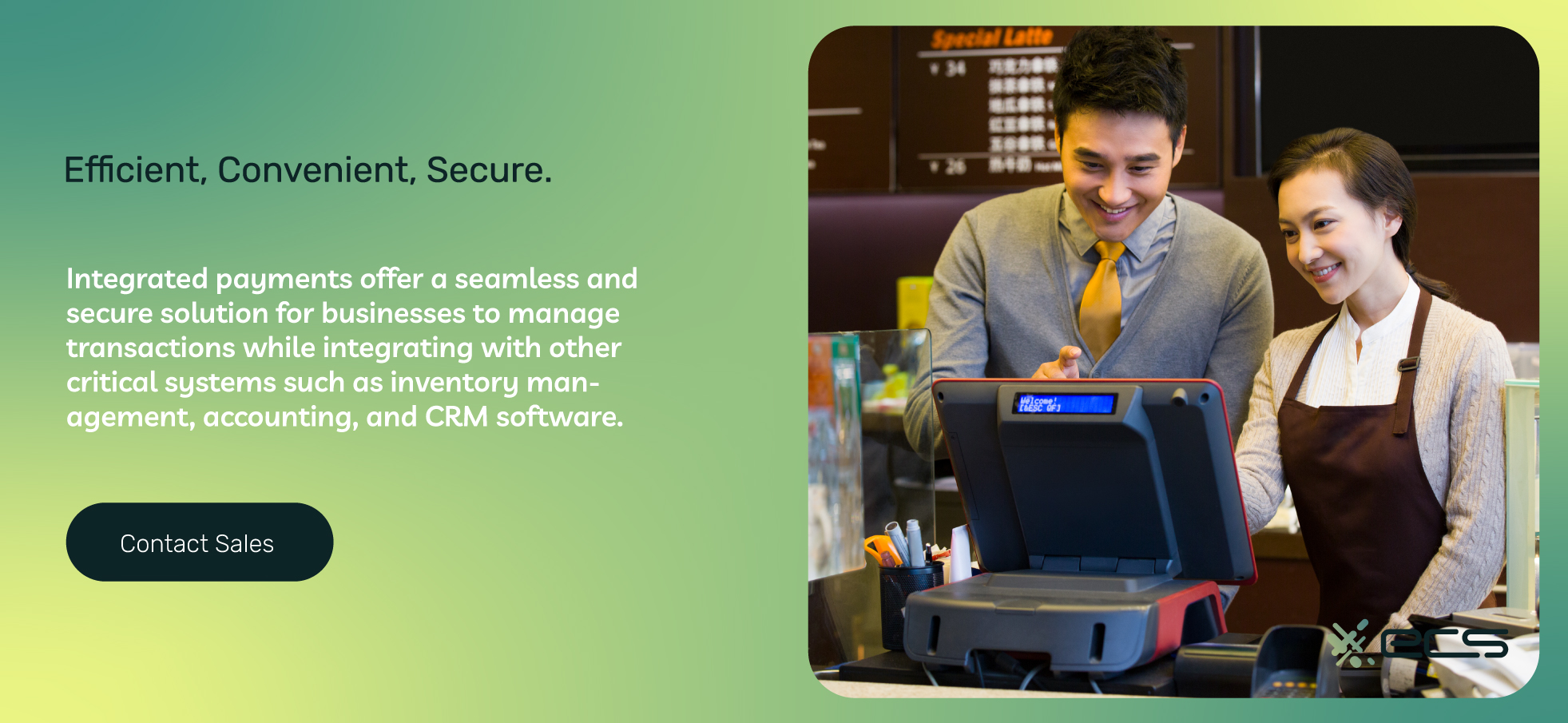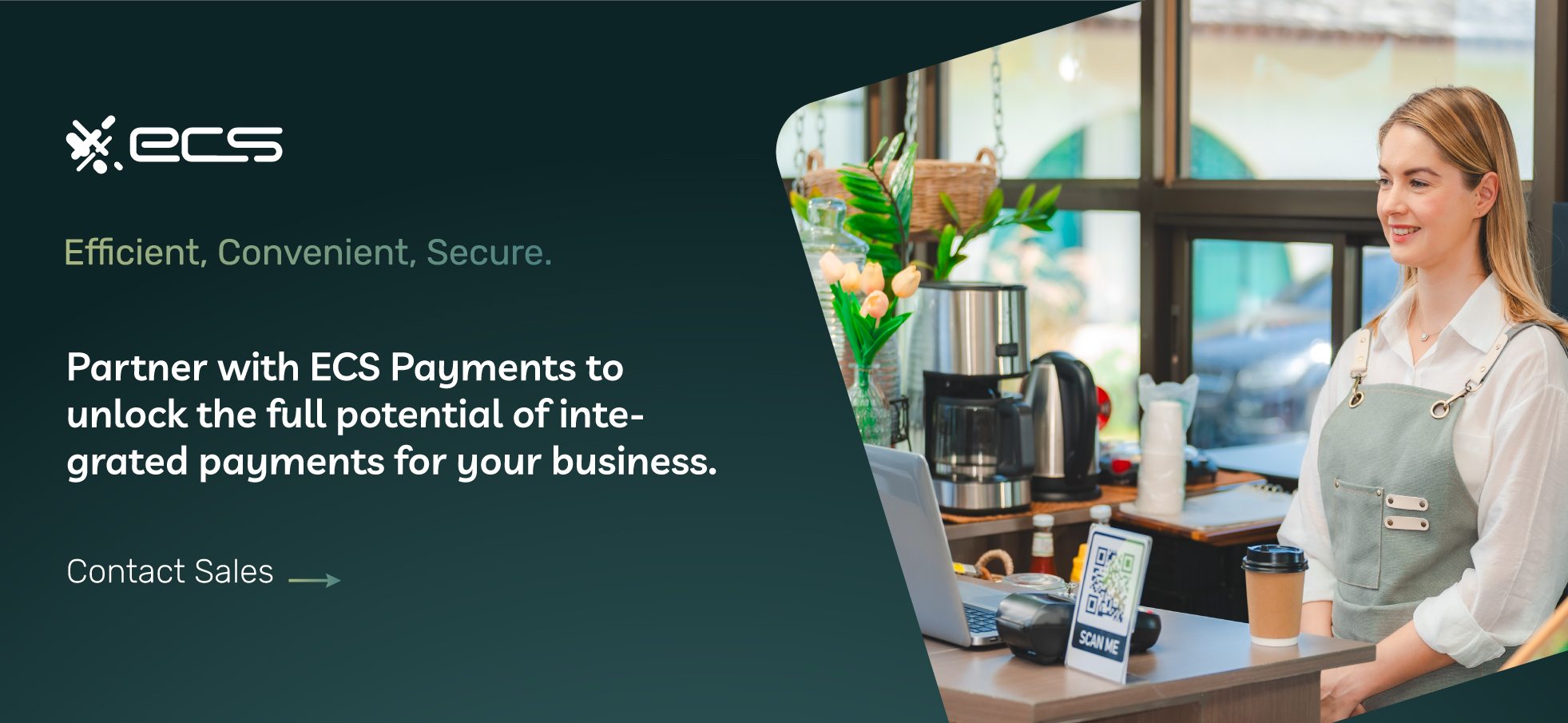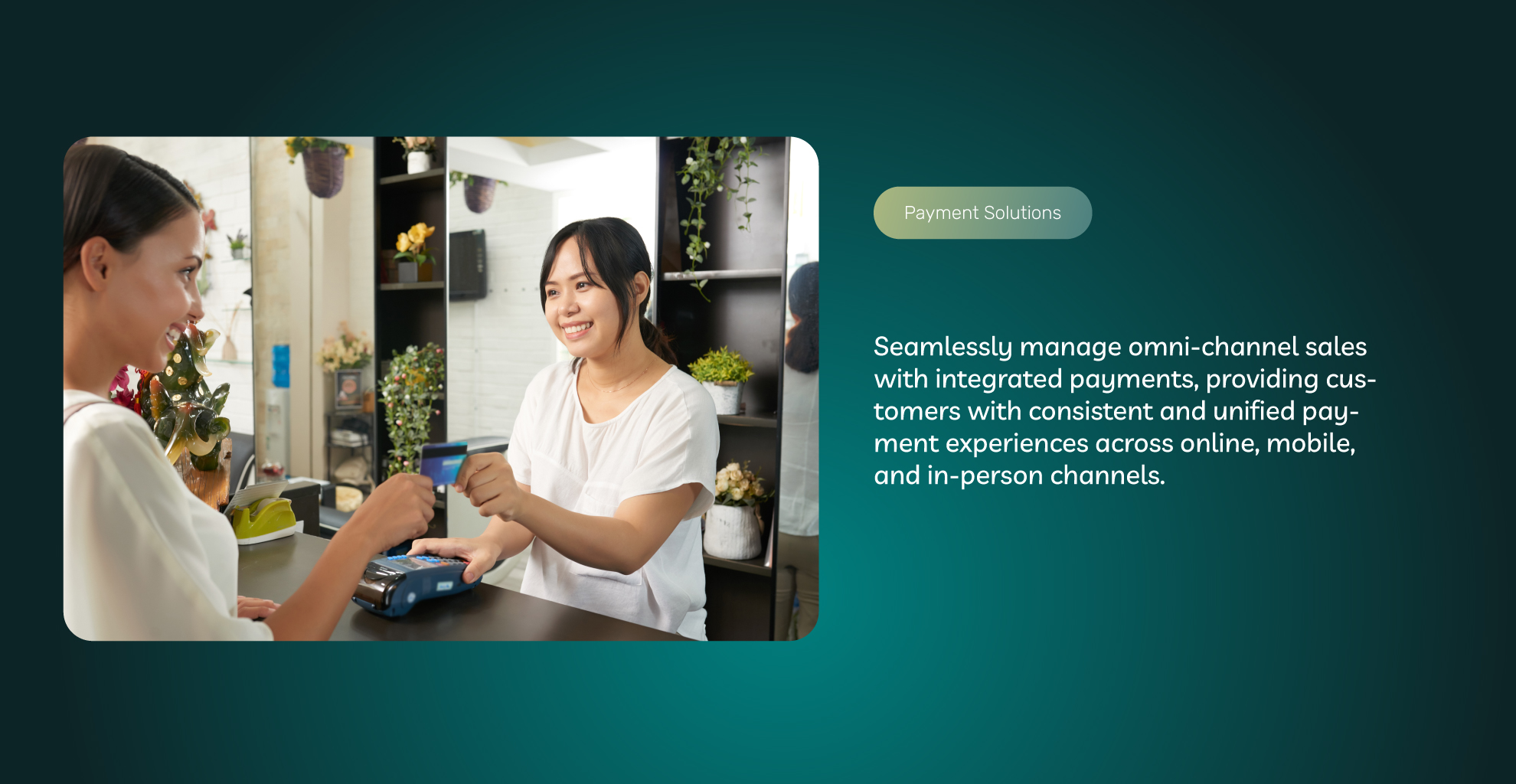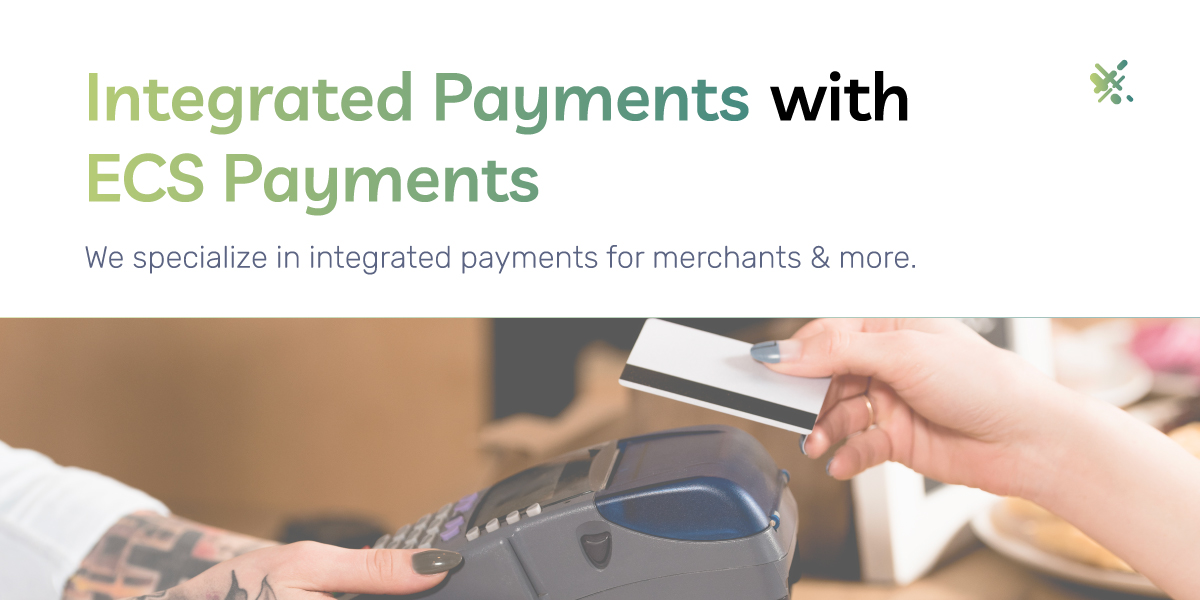If you operate a business, you should already know how vital payment processing can be.
Beyond just the ability to accept payments from your customers, modern payment processing can be combined with other critical business operations to help you cut costs and improve efficiency.
Much of this is done through integrated payment solutions. Integrated payments enable combining your payment technology with other essential business software and business functions.
By doing this, you remove redundancy and increase productivity. These benefits help you reduce your overhead and improve your profit margins.
To help you take advantage of integrated payments, we’ll explain how they work and how you can use them to help your business scale up faster than ever.
What Are Integrated Payments?
Integrated payments describe a system where your payment processing hardware and software work together with other existing business operations.
A perfect example can be a retail point of sale (POS) system. This POS system manages your day-to-day payment transactions while also integrating with your inventory management system.
This standard integration enables you to avoid manual inventory management by automatically deducting inventory every time a purchase is made.
Beyond just improved efficiency, this type of integration with your payment system also reduces errors, so your inventory is always accurate and up to date.
It’s important to note that integrated payments is an umbrella term, and the above example is just one instance of possible integration.
Also, there are no extra transaction fees when processing payments via integrated payment solutions or eCommerce platforms. The checkout process, payment service, and transaction data function similarly.
This helps to provide a seamless user experience that doesn’t add any cost to your processing.
Without integrated payments, you would need to use services such as hosted payment gateways, which can disrupt the overall customer experience and create cart abandonment and poor conversions.
However, the key to taking advantage of integrated payment is having a payment processor that can offer the latest payment solutions via your merchant account.
Not all merchant accounts and payment processors can offer the full benefits of payment integration technologies. This is why choosing your payment processor and merchant account is essential in today’s technology-driven business environment.

Benefits Of Integrated Payments
Integrated payments allow for benefits across an entire business. Below are the main benefits that business owners can enjoy when utilizing integrated payments.
Improved Efficiency
Every business owner knows that inefficiency costs money, which can drain the bottom line.
The core function of integrated payments is to provide increased efficiency at minimal cost. Businesses can remove redundancies and manual data entry by combining related software tasks.
For businesses looking to boost revenue, scaling is generally the best strategy. However, inefficiencies can hamper scaling efforts, causing expenses to balloon as you build revenue.
The efficiencies created by integrated payments prevent this from happening. The result is your expenses stay consistent as you increase your customers and sales.
A common example of this improved efficiency is combining payment services with accounting or invoicing software. This lets you send payment requests and invoices directly from your accounting platform.
Combining these two systems reduces the need for manual invoicing, freeing up manpower to focus on more critical tasks.
Better Security
Fewer systems to maintain means you will have fewer security issues. Using many systems requiring security patches and maintenance can quickly get out of control, leaving data vulnerable to attackers.
Integrated payments are primarily based in the cloud. Having your data serviced in the cloud ensures that enterprise-grade security measures always protect your data. This lowers your security burden and liability since much of the data becomes the responsibility of the payment gateway or other service provider.
These service providers have dedicated staff to deal with security, creating a far better environment for data security and handling.
Real-Time Data Analytics
Using data and analytics is now critical for businesses of all sizes. This can be especially true for e-commerce retailers needing data to gain customer insight. Without analytics or customer interaction, it can be impossible to capture relevant data.
Payment integration is central to a business’s analytics because payment data holds so much information about customer behavior.
Businesses can immediately access the data they need by integrating payment systems with analytics software or customer relationship management (CRM) software.
Without this type of integration, merchants would have to manually capture data and then transfer it to a single source, such as spreadsheets. This is time-consuming and prone to errors. Worse yet, data can be outdated by the time you compile all of it.
As data-driven decision-making becomes common in small businesses, integrated payments are crucial in providing an easy way to capture and compile your sales data.
Payment Integration For Different Business Models
Your business may have a specific requirement for billing. For example, if your business relies on a recurring payment model, integrated payments can make this experience seamless for your customers.
Customers can access tools like customer portals to look up their past billing invoices or update their information on file.
This saves your business the time to deal with these requests manually. But for this to work, you will need a secure integration between your payment gateway and customer management software.
Another business model that can benefit from integrated payments is service-related businesses.
If you provide services and need to bill or invoice customers, integrated payments can allow you to send individualized payment links directly to customers.
Customers can receive these personalized payment links through email or SMS text messages. Once the customer receives it, they proceed to a custom payment page where they can immediately pay their invoice.
If the customer has their billing information on file, the system can automatically populate those fields.
This type of payment integration utilizing payment links can speed up the entire invoicing process. This means your business receives payment faster, and you spend less time sending out invoices and tracking unpaid bills.


How To Set Up Payment Integrations
Most payment integrations are relatively easy to set up if you have the right merchant account and payment processor.
At ECS payments, we offer several payment gateway options with extensive available integrations built into the merchant dashboard.
This allows you to take advantage of many integrations without needing a developer or coding specialist.
Using APIs To Set Up Your Integrated Payments
An API or Application Programming Interface is a specific protocol to facilitate communications between two services.
That may sound complicated, but as a merchant, you only need your API keys and login credentials to enable most integrated payments.
Your API key and login credentials authenticate your merchant account as the source of the data being sent and requested on the network. This keeps the data secure and your connection safe.
Typical API Integration
Now, let’s look at a typical API integration that a merchant would make so you can see how easy it is.
Let’s say a merchant has set up an e-commerce website in addition to their physical retail location. The merchant wants customers to be able to choose and purchase items directly on the e-commerce website.
To make this possible, the merchant must first integrate their existing payment system with the e-commerce website. This is done via payment gateway integration.
Step 1: Obtaining API Keys & Credentials
If the merchant uses ECS Payments, they first go to their payment gateway’s merchant dashboard. This dashboard gives merchants access to all the API keys and other features needed for integrated payments.
Once at the dashboard, the merchant would go to their account section and click on the menu for security settings.
Once there, merchants will find an option for API keys and credentials. Entering this area of their dashboard will allow them to view their credentials and generate an API key.
Step 2: Entering The API Keys Into The e-commerce Site
When you have your merchant API keys and login credentials, you can then enter them in the appropriate area within your e-commerce website.
A common example is connecting the API with your chosen shopping cart or e-commerce platform software.
If you’re using WordPress to design your site, you will have a plugin to handle the payment and checkout functionality. Depending on the payment gateway you use, they may offer a plugin of their own to use within WordPress.
Go into the settings of your chosen payment gateway plugin, and there will be an area to enter your payment gateway API keys and credentials.
You then enter the information you previously obtained from your merchant dashboard into the appropriate field.
Step 3: Test The Connection
Once you have entered your API information, the integration is complete, and you can run a test to ensure everything is working properly with your online payment integration.
Your payment processor can provide you with dummy payment information for testing transactions. These dummy credit card numbers function just like an actual credit card but won’t transfer any funds.
Test all payment options you offer on the checkout page to ensure your payment gateway works as intended.
When your testing is complete, you can now accept credit and debit card payments through your website via the newly established integrated payment.
Overall, website payment integration is one of the most common uses of integrated payment processing for an online store.

Other Integrated Payment Examples
Our previous example involved using integrated payments for an e-commerce retail website. Online businesses regularly use integrated payments, but what if you operate a sales or service-related business?
Integrated payments can also work for these businesses, and setting it up is just as easy.
For example, if you are a service provider and use Salesforce CRM software to track your leads and sales, you can integrate your payment gateway with your CRM.
When you integrate these two systems, Salesforce enables you to send invoices and payment requests through integrated billing.
With integrated payments, you can close deals faster and more efficiently without having to bother with manual invoicing.
To create this type of integration, you will go through a process similar to the one we explained earlier.
Once you obtain your API keys through your merchant dashboard, you will then enter them into Salesforce or your chosen CRM.
For Salesforce, you would go into your settings and choose a new remote site. You will then enter a URL for your payment gateway. For example, if you’re using Authorize.net, you will use the Authorize.net API URL.
Once you enter the URL, go to your payment gateway configuration settings and enter the rest of your API information.
When the integration is complete, you can now send invoices and collect payments directly from Salesforce.
This is perfect for when you need to close deals on the go or require a partial payment to begin work on a service-related job.
Many other software programs can integrate with your payment system in the same way as this example did using the popular Salesforce CRM.
Get Help Setting Up Integrated Payments For Your Business
Setting up integrated payment is relatively easy once you understand the process. However, having a trusted technology partner to guide you is always helpful.
At ECS Payments, we specialize in integrated payments for merchants so they can streamline their business operations and scale like never before.
Our payment solution experts can help guide you through the entire integration process from start to finish. We also offer the latest merchant account technology that integrates with virtually any business-related software.
Contact ECS Payments to learn more about integrated payments and how they can start benefiting your business today.
Frequently Asked Questions for Integrated Payments with ECS Payments
Integrated payments is a system where payment processing hardware and software seamlessly collaborate with other business operations and tools such as inventory management or accounting systems in one connected environment.
An example is a retail POS system integrating with inventory management software, automatically updating inventory data with each purchase. This avoids manual data entry, reduces errors, and ensures accurate and up-to-date information.
Contact ECS Payments today to learn more about implementing integrated payments into your business
Integrated payments offer various benefits, including improving efficiency by eliminating redundancies and manual data entry. They enhance security by reducing the number of systems to maintain and ensuring cloud-based security measures. Businesses also gain real-time data analytics, which is crucial for decision-making. And cut costs, leading to streamlined business operations.
APIs facilitate communication between services. Merchants need API keys and login credentials to enable integrated payments.
ECS Payments offers extensive integrations built into the merchant dashboard, allowing merchants to take advantage of various integrations without requiring a developer or coding specialist.
Setting up integrated payments with ECS Payments is easy. The process involves obtaining API keys and credentials from the ECS Payments merchant dashboard, entering them into your business’s software or website, and testing the connection.
If needed, ECS Payments provides expert guidance through the entire integration process. Contact us today to learn more about implementing integrated payments into your business.
